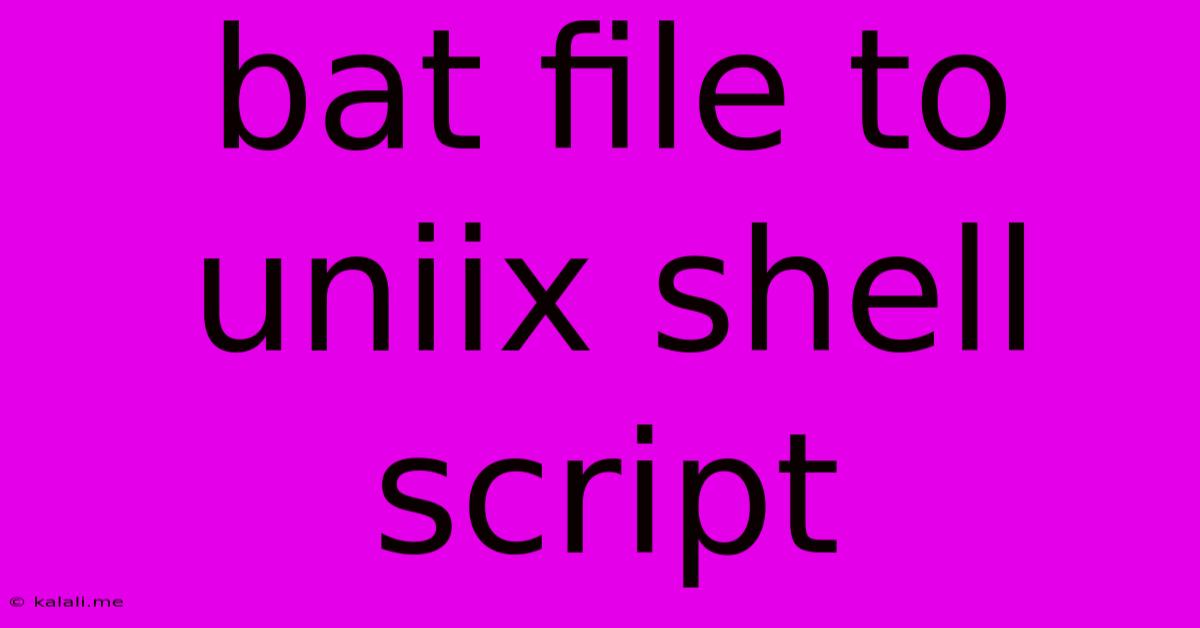Bat File To Uniix Shell Script
Kalali
Jun 09, 2025 · 3 min read

Table of Contents
Converting Batch Files to Unix Shell Scripts: A Comprehensive Guide
This article provides a comprehensive guide on converting batch files (.bat) designed for Windows to Unix shell scripts (typically .sh). While a direct, line-by-line translation isn't always possible due to fundamental differences between the operating systems, this guide outlines common commands and techniques for achieving equivalent functionality. This process often involves understanding the core logic of the batch file and rewriting it using appropriate Unix commands.
Understanding the Differences:
Before diving into the conversion process, it's crucial to understand the key differences between batch files and Unix shell scripts:
- Command Interpreter: Batch files utilize the Windows
cmd.exeinterpreter, while Unix shell scripts use interpreters likebash,zsh, orsh. These interpreters have distinct command sets and syntax. - Command Syntax: The syntax for commands differs significantly. For example, file paths in Windows use backslashes (
\), while Unix uses forward slashes (/). - Built-in Commands: Each system offers a unique set of built-in commands. Many Windows-specific commands lack direct Unix equivalents, requiring alternative approaches.
- Variable Handling: Variable declaration and usage differ considerably.
- Error Handling: Techniques for handling errors and managing program flow differ between the two environments.
Common Conversion Strategies:
Here's a breakdown of how to convert common batch file commands and constructs to their Unix shell script equivalents:
1. File Path Conversion:
- Windows:
C:\path\to\file.txt - Unix:
/path/to/file.txt
Remember to replace backslashes (\) with forward slashes (/).
2. Echoing Output:
- Windows:
echo Hello, world! - Unix:
echo "Hello, world!"
Note the use of double quotes in Unix to handle spaces correctly.
3. Running External Commands:
- Windows:
dir(lists directory contents),copy(copies files),del(deletes files) - Unix:
ls(lists directory contents),cp(copies files),rm(deletes files)
Replace Windows commands with their Unix counterparts.
4. Conditional Statements (if-else):**
- Windows:
if exist file.txt (
echo File exists
) else (
echo File does not exist
)
- Unix:
if [ -f file.txt ]; then
echo "File exists"
else
echo "File does not exist"
fi
Note the use of [ -f file.txt ] to check for file existence in Unix. The test command (often aliased as [) is used for conditional evaluations.
5. Looping (for loop):
- Windows:
for %%a in (*.txt) do (
echo %%a
)
- Unix:
for file in *.txt; do
echo "$file"
done
Note the different syntax for iterating over files.
6. Variable Assignment:**
- Windows:
set myVar=value - Unix:
myVar="value"
7. Handling User Input:
- Windows:
set /p myVar=Enter value: - Unix:
read -p "Enter value: " myVar
Example Conversion:
Let's say we have a simple Windows batch file:
@echo off
echo Hello, world!
if exist myfile.txt (
echo File exists
) else (
echo File does not exist
)
Its Unix shell script equivalent would be:
#!/bin/bash
echo "Hello, world!"
if [ -f myfile.txt ]; then
echo "File exists"
else
echo "File does not exist"
fi
Remember to add #!/bin/bash as the shebang at the beginning of your Unix script to specify the interpreter.
Advanced Considerations:
Complex batch files might require more advanced techniques, including using sed, awk, or other powerful Unix utilities to manipulate text, process data, and handle intricate logic. Understanding regular expressions will be particularly helpful.
By following these guidelines and adapting them to the specifics of your batch file, you can effectively convert your Windows scripts to run seamlessly under Unix-like operating systems. Remember to test thoroughly after conversion to ensure accurate functionality.
Latest Posts
Latest Posts
-
Is A Brake Fluid Flush Necessary
Jun 09, 2025
-
Is The White Wire The Hot Wire
Jun 09, 2025
-
How To Turn The Boiler On
Jun 09, 2025
-
Json Convert Why Are Keys Uppercase
Jun 09, 2025
-
What Causes Air In Water Lines With A Well
Jun 09, 2025
Related Post
Thank you for visiting our website which covers about Bat File To Uniix Shell Script . We hope the information provided has been useful to you. Feel free to contact us if you have any questions or need further assistance. See you next time and don't miss to bookmark.